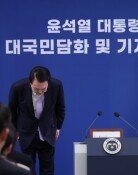Workplace Disclosure Allowed in Case of a Strike
Workplace Disclosure Allowed in Case of a Strike
Posted September. 04, 2003 22:55,
Employers will be allowed to widely use workplace disclosure and replacement labor, measures they could take in case of strikes.
The unemployed will be able to join supra-labor unions that encompass many companies such as regional labor unions and industrial unions. Government mediation in strikes held on public utility service providers will be abolished, virtually preventing strikes at those firms.
The Ministry of Labor reported `the roadmap for labor management relations improvement` which includes measures to improve labor-related laws and regulations during the plenary session of the Korean Tripartite Commission between the labor, the management and the government participated by President Roh Moo-hyun.
The measure, commissioned by the labor ministry and proposed by the Labor Management Relations Improvement Research, will be discussed by labor and management representatives at the Tripartite Commission before it is submitted to the government for enactment.
Much controversy is expected as the new measure draws mixed reactions from the management and the labor circles. The management generally welcomes the proposal while the labor expresses stiff opposition saying that it would weaken trade unions and make it difficult to stage strikes at public utility providers.
The proposal will strengthen measures that employers could take against labor strikes.
Under the proposed measure, workplace disclosure, which is currently applied only to legal labor strikes, could be employed in case of both legal and illegal strikes. Replacement labor, a measure to help make up for labor shortage during a strike, could be used by public utility companies even during legal strikes.
Meanwhile, to improve labor rights, the new measure would allow unemployed workers to join supra-labor unions, abolish government-intervention in walkouts, legalize partial wage payment for heads of trade unions and expand the subjects for labor-management negotiations and reasons for strikes.
The Ministry of Labor reported its 3 major goals such as minimizing social costs incurred by conflicts between labor and management, realization of a flexible and stable labor markets and the social protection for workers as well as ways to achieve them.
Minister of Labor Kwon-ki Hong said, ˝The ministry will sternly deal with 5 major illegal strikes such as the labors occupation of major production facilities, blockage of a workplace, interruption of operation on a workplace, use of violence, threats of facility destruction and employers unfair demands toward workers.˝
Kyung-Joon Chung news91@donga.com







